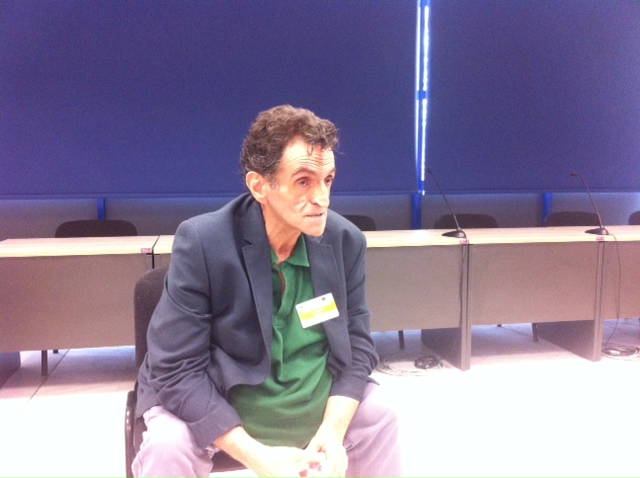Photo: rferl.org
Anastasia Balezdrova
The new cases of people infected with HIV and related infections remain a serious problem for healthcare systems in Europe. The studies show an increase in the number of new infections, which indicates a constant and continuous transmission of the AIDS virus in many European countries. At the same time, almost in half of all the new cases the people infected with the virus are at the late stage of the infection, which means a low use of testing for HIV and limited access to it.
The challenges facing the European Union and the healthcare systems of the Member States relating to the spread of the virus were discussed at a media cluster meeting on European projects against the spread of HIV, which took place within the context of the Greek Presidency of the European Union in Athens.
"The majority of the European Union citizens who suffer from AIDS receive the appropriate treatment and therefore the disease can be defined as a "chronic" situation. We can say that we know almost everything about it, namely how it is transmitted, how it can be controlled, how those affected by it can be helped. Today the challenge before us is to be able to communicate the information to certain closed social groups for which the issue is different," said Martin Seychell, Deputy Director-General in the Health and Consumer’s Directorate of the European Commission.
He pointed out that in these groups the transmission of the virus increases, because their members are isolated and the institutions do not have easy access to them. "If we can mobilize civil society and find mediators to build bridges to these groups we will be able to limit the spread of the virus," he said and pointed out that this process must be done carefully, without violating human rights, and without discrimination and stigmatization.
Inevitably, the discussion considered the case of the women, who were apprehended in the centre of Athens two years ago on charges of being prostitutes and a threat to public health if they were carriers of the AIDS virus.
Representatives of the Greek Ministry of Health defended the decision of Minister of the time Andreas Loverdos, although it was subsequently proven that, with the exception of one sex worker, the women were not prostitutes but drug addicts. The case of their arrest and subsequent imprisonment was presented in Zoe Mavroudi’s documentary "Ruins".
According to the Secretary General of the Ministry, the case was isolated and urgent, which is why it was necessary to issue a presidential decree to solve it. According to Greek activists, however, the document was used again in July 2013.
The discussion made it clear that this is not just Greece’s problem. "In Germany and other countries there are also public debates on whether particular social groups should be required to be tested for HIV in case they pose a danger to public health," said psychologist and researcher Tsvetina Arsova - Nettselman from SPI Research GmbH centre in Berlin.
According to Luis Mendao from the European people living with HIV association, however, men who choose to enjoy sex services are not a risk group as it is a widely known fact that the use of condoms prevents the transmission of the virus.
In an interview for GRReporter he talked about his struggle with the disease that began with its diagnosis in September 1995. "I was infected through drug use. It was in the early 1980s, we knew very little about AIDS, and the preparation and use of the drug in the company of friends was like a ritual. I think that the majority of the infections were transmitted in this way at that time, their transmission through sexual acts began much later."

When the doctor told him his diagnosis Luis got in touch with most of his sexual partners to warn them and advise them to be tested for HIV. "I would say that we had used a condom in the majority of the cases but I wanted to inform them and warn them to be tested. All had negative results. Of course, there were people with whom I had lost contact and I could not reach. I do not know about them."
Luis learnt that his infection was at a rather late stage and immediately began taking a combination of three pills. "I was told that without medicines I could live six months. I was one of the first patients who started this treatment. None of these medicines is used today because they have too many side effects. Now I take three tablets a day, one in the morning and two at night. By comparison, when I started I was taking 32 tablets a day, some with food, others without food and at fixed hours six times a day. At that time I had to adjust my daily round to the taking of medicines whereas I am free now."
Luis was committed to the protection of human rights even before he was infected with AIDS. "Soon it will be 20 years since then. All this time I have been trying to be part of the solution rather than part of the problem. This was a huge physical challenge. It is not easy, you constantly have to be careful. I am 57 years old but I feel like 80. I have pains, I move my legs with my hands when I get in the car and I experience other such difficulties. However, things are not difficult for the majority of the people who start their treatment now. I know many people who have been undergoing an antiretroviral therapy for 10 years now and they look good and feel good."